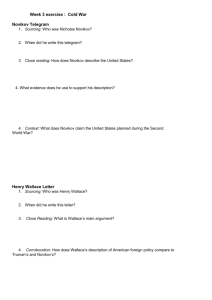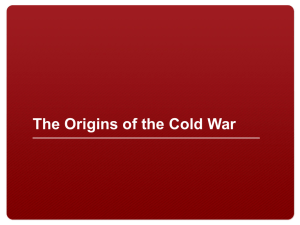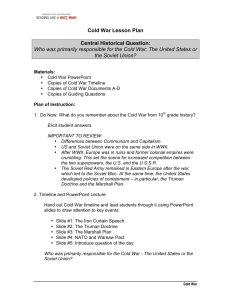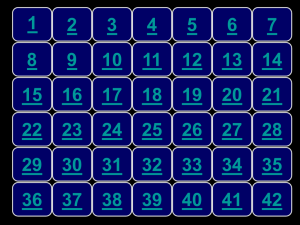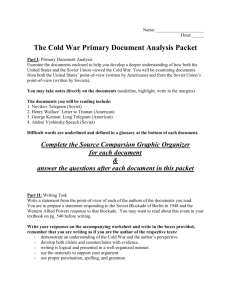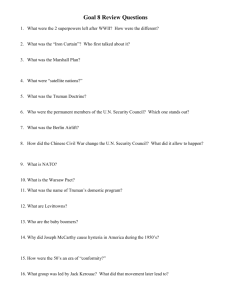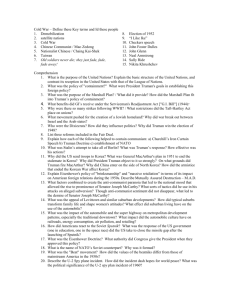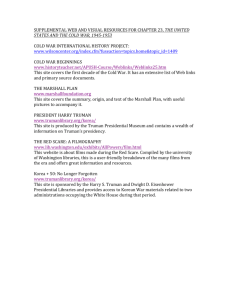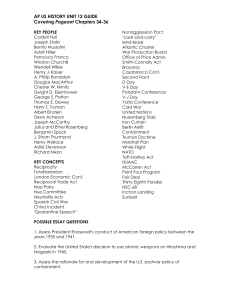Cold War Origins: Churchill, Truman, Novikov, Wallace
advertisement
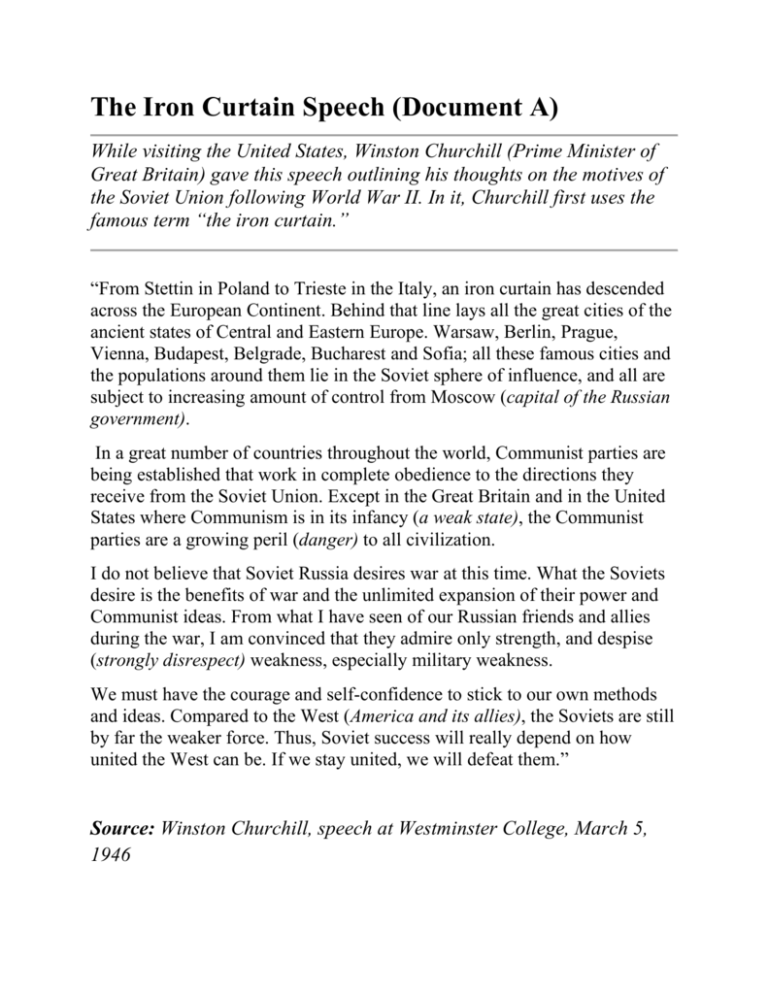
The Iron Curtain Speech (Document A) While visiting the United States, Winston Churchill (Prime Minister of Great Britain) gave this speech outlining his thoughts on the motives of the Soviet Union following World War II. In it, Churchill first uses the famous term “the iron curtain.” “From Stettin in Poland to Trieste in the Italy, an iron curtain has descended across the European Continent. Behind that line lays all the great cities of the ancient states of Central and Eastern Europe. Warsaw, Berlin, Prague, Vienna, Budapest, Belgrade, Bucharest and Sofia; all these famous cities and the populations around them lie in the Soviet sphere of influence, and all are subject to increasing amount of control from Moscow (capital of the Russian government). In a great number of countries throughout the world, Communist parties are being established that work in complete obedience to the directions they receive from the Soviet Union. Except in the Great Britain and in the United States where Communism is in its infancy (a weak state), the Communist parties are a growing peril (danger) to all civilization. I do not believe that Soviet Russia desires war at this time. What the Soviets desire is the benefits of war and the unlimited expansion of their power and Communist ideas. From what I have seen of our Russian friends and allies during the war, I am convinced that they admire only strength, and despise (strongly disrespect) weakness, especially military weakness. We must have the courage and self-confidence to stick to our own methods and ideas. Compared to the West (America and its allies), the Soviets are still by far the weaker force. Thus, Soviet success will really depend on how united the West can be. If we stay united, we will defeat them.” Source: Winston Churchill, speech at Westminster College, March 5, 1946 Truman Doctrine (Document B) In 1947, U.S. President Truman vowed to help countries resist Communism wherever it arose. This came to be known as the Truman Doctrine. Below is an excerpt from the speech where President Truman first unveiled this new doctrine. “The peoples of a number of countries of the world have recently had totalitarian regimes forced upon them against their will. The Government of the United States has made frequent protests against coercion and intimidation in violation of the Yalta agreement in Poland, Romania, and Bulgaria. At the present moment in world history nearly every nation must choose between alternative ways of life. The choice is too often not a free one. One way of life is based upon the will of the majority, and is distinguished by free institutions, representative government, free elections, guarantees of individual liberty, freedom of speech and religion, and freedom from political oppression. The second way of life is based upon the will of a minority forcibly imposed upon the majority. It relies upon terror and oppression, a controlled press and radio, fixed elections, and the suppression of personal freedoms. I believe that it must be the policy of the United States to support free peoples who are resisting attempted subjugation by armed minorities or by outside pressures. The free peoples of the world look to us for support in maintaining their freedoms. If we falter in our leadership, we may endanger the peace of the world. And we shall surely endanger the welfare of this nation. Great responsibilities have been placed upon us by the swift movement of events. Source: Excerpt from the “Truman Doctrine Speech,” delivered by President Truman to Congress on March 12, 1947. Name________________ Guiding Questions Document A (Iron Curtain Speech) 1. Source: Who is Winston Churchill? What perspective (side of the story) does he provide? 2. Close Reading: According to Churchill, what do Soviet leaders want? Document B (Truman Doctrine) 1. Close Reading: According to Truman, what are the two “alternative ways of life” people have to choose from? Explain 2. Close Reading: Does Truman present American policy as offensive or defensive? What words or phrases does Truman use to present American policy this way? Record your first hypothesis: Who was most responsible for the Cold War The United States or the Soviet Union? Novikov Telegram (Document C) In September 1946, partially in response to perceived American aggression, Nikolai Novikov, the Soviet Ambassador to the United States, was told to write a report about American foreign policy. Josef Stalin, the leader of the Soviet Union, read this telegram. “The foreign policy of the United States in the post-World War II period, which reflects the imperialist tendencies of American capitalism, is striving for world supremacy (domination). This is the real meaning of the many statements by President Truman and other representatives of American ruling circles. They believe that the United States has the right to lead the world. For this purpose broad (big) plans for expansion have been developed and are being implemented through diplomacy and the establishment of a system of naval and air bases stretching far beyond the boundaries of the United States, through the arms race, and through the creation of ever newer types of weapons. During the Second World War American leaders calculated that the United States of America, if it could avoid direct participation in the war, would enter it only at the last minute, when it could easily affect the outcome of the war, completely guaranteeing its economic and political interests. In this regard, it was thought that the main competitors of the United States would be crushed or greatly weakened in the war, and the United States by virtue of this circumstance would assume the role of the most powerful nation in resolving the fundamental questions of the postwar world. This would give the United States a step towards world domination. In order to guarantee its safety and its future, the Soviet Union must continue to possess the friendship and loyalty of the countries of Eastern Europe and around the world.” Source: Ambassador Novikov, Telegram. September 27, 1946 Henry Wallace (Document D) The following is an excerpt from a letter by Secretary of Commerce and former Vice President Henry A. Wallace letter to President Harry S. Truman, dated July 23, 1946. Truman asked Wallace to resign shortly after this letter. “I have been increasingly disturbed about the trend of international affairs since the end of the war. How do American actions appear to other nations? I mean actions such as the Bikini Islands tests of the atomic bomb and continued production of bombs, the plan to arm Latin America with our weapons, and the effort to secure air bases spread over half the globe from which the other half of the globe can be bombed. I cannot but feel that these actions must make it look to the rest of the world as if we were only paying lip service (pretending) to peace at the conference table. These facts rather make it appear either that we are preparing ourselves to win the war which we regard as inevitable or that we are trying to build up a predominance (the largest amount) of force to intimidate the rest of mankind. Our interest in establishing democracy in Eastern Europe, where democracy by and large has never existed, seems to the Soviets as an attempt to reestablish the encirclement (surround them) of unfriendly neighbors which might serve as a springboard of still another effort to destroy them. Source: Secretary of Commerce Henry Wallace, Letter to President Truman, July 23, 1946 Name________________ Guiding Questions Document C (Novikov Telegram) 1. Source: Who is Nicholas Novikov? What perspective (side of the story) does he provide? 2. Close Reading: How does Novikov describe the United States? What evidence does he use to support his description? 3. Close Reading: What does Novikov claim the United States planned during the Second World War? Document D (Henry Wallace) 1. Source: Who is Henry Wallace? What is his relationship to the US government? 2. Summarize: What is Wallace’s main argument? Please explain Record your second hypothesis: Who was most responsible for the Cold War - The United States or the Soviet Union?
